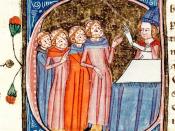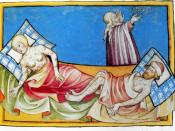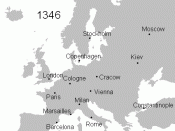The Historical Impact of the Black Plague
In the fourteenth century, plagues swept through Europe, killing a quarter of a million people and recurring approximately five times for nearly a century. It made humankind fully aware of life's brevity and of death's pitilessness. This "Black Death" changed history, placed a twelve-year-old-king on the throne and weakened the Church's grip on the people such that it never regained its full power.
Events that would shock future generations occurred daily in this era, when people were so confused, ashamed and helpless that they ignored old customs and religious practices. Pope Clement VI had to consecrate the Rhone River so corpses could be sunk in it, families buried their dead only to have the bodies exhumed a week or two later to make room for more, mass graves were dug outside towns for cadavers to be discarded in. People were blind to the atrocities committed everywhere and accepted them as a typical way of life.
(Knox 1)
The Black Death is thought to have originated in Asia's Gobi Desert and was brought to Europe by traveling armies in the 1340's. Plague was perhaps the world's first biological weapon: diseased carcasses were catapulted into besieged cities to kill defending troops. Obviously, the plague was indiscriminate, and townspeople, invading soldiers and local militia were all stricken. So this tactic had the desired effect, but it often came at a steep price. (Rice 1)
The Black Death was spread by these armies, travelers and especially vermin, specifically fleas. These tiny, ostensibly innocent pests brought about this dark period in history merely doing what they do best. The flea feeds on an infected rat and moves on to a human. Then the flea regurgitates the blood from the rat into the human, infecting the human. The rat...


